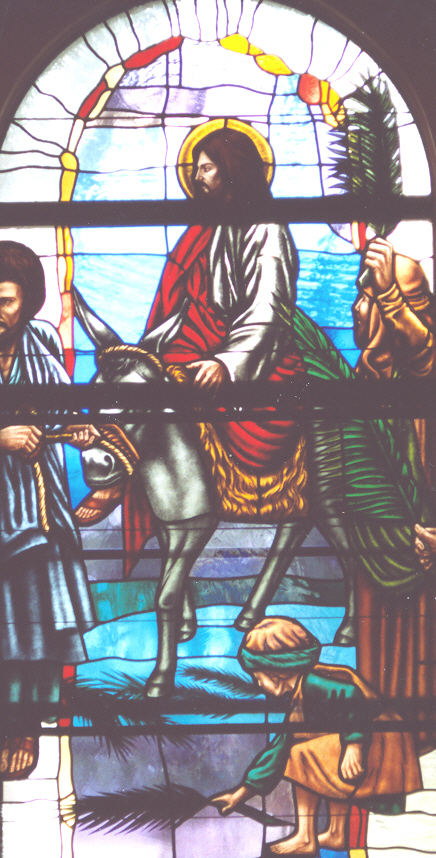
Return to
Index The Catholic Faith
Return
to Level One Topic Index
Home Page
Many a person has thought, "If only I had lived in Palestine in the days of Jesus. It would be so easy to believe in him, after seeing his miracles with my own eyes. And it would be easy to love God and be holy after getting to meet Jesus and talking to him."
Would it really be easier? If so, then what was wrong with all the people who saw the miracles, heard Jesus teach, yet did not believe? Yes, if you, a Christian who had received the gift of faith at Baptism, could have gone back in time to meet Jesus, it probably would have increased your faith. But if you had been a first-century Jew, it might have been a different story.

As we saw before, the Jewish people lived in expectation of the coming Messiah. Even among themselves, however, they did not agree on what he would do when he came. The Jews were divided into groups: Pharisees, Sadducees, scribes, Essenes, Zealots, Herodians. (The names of some of these you may recognize from the Gospel stories you have heard or read.) Each group had its own idea of what the Messiah should be; each group thought he should be one of them. It turned out that Jesus did not fit the pattern of any of them.
Instead of spending his time with scribes, Pharisees, and other important people, Jesus more often gave his attention to the ordinary people, fishermen, farmers, housewives. He told stories to children. He even took his meals with people known to be great sinners. To the important people, this did not seem to be proper behavior for the Messiah.
The people were so certain that the promised Savior would look and act a certain way that, when Jesus was different, they did not accept him. Even though there were miracles, it still took faith to believe that God sent a different kind of Savior.
Many of the people who liked Jesus turned away on the day he first mentioned the Holy Eucharist. "I am the living bread . . . the bread I will give is my Flesh for the life of the world". (Jn 6:51). To most of the people the idea of eating another man's flesh sounded strange and sinful. Many did not have enough faith to stay with Jesus and wait for the time when the mystery of the Eucharist would be made more clear to them.
The Jewish leaders were not merely upset about Jesus. They actually hated him. For the Pharisees, Jesus did not seem to have proper respect for the Law of Moses. For the Sadducees, Jesus seemed to be stirring up unrest among the people. The scribes were probably disturbed because Jesus did not consult them on the interpretation of the Law. Jesus did not identify himself with any of the leaders or with the groups. It is quite the opposite. He was bold enough to tell them where they were wrong, saying of the Pharisees, for example, that they were "hypocrites" and comparing them to whitewashed tombs, beautiful on the outside but decayed and ugly on the inside.
It was common Jewish thought that great wealth was a sign of God's favor, and poverty a punishment from God on those who sinned. On the contrary, said Jesus, "It is easier for a camel to pass through the eye of a needle than for a rich man to enter the Kingdom of Heaven." Jesus taught that God had a special love for the poor and suffering.
What made these religious leaders resent Jesus most of all was his popularity. The people loved to listen to him, and follow the way of life Jesus preached. The Pharisees, scribes, and priests became jealous. They tried again and again to get Jesus to say something that was against God's law. They would ask Jesus difficult questions, not in order to learn, but in the hope of catching him in some mistake. But Jesus always found a way to make the truth clear, and show the falsehood of his questioners.
The enemies of Jesus witnessed many of his miracles. But they did not want Jesus to be the Messiah. Believing in him would force them to repent of their sins and change their lives in too many ways. They were too proud to admit that the man they hated might be God's Son. So they told themselves that all those wonderful miracles were the work of the devil. They wanted to kill Jesus and set to work planning to do so.
Jesus was rejected by many of the religious leaders and people of his time, but this rejection was not a one-time event. Every time someone commits a mortal sin he turns away from Jesus. To commit a mortal sin is to act as if Jesus does not belong in one's life. Even when we commit only a venial sin, we show that we do not love Jesus as much as we ought to. We are like the apostles, who loved Our Lord but ran away when things became difficult.
If we look around us we can see that in many ways our society rejects Jesus. We hear many use his Holy Name in a careless or angry way. The characters in many TV shows and movies act as if Jesus did not exist. All around us we see that God's gift of human life is not treated with love and reverence.
Since Jesus is rejected in so many ways by so many, we want to do what we can to make up for this. By refusing to go along with a godless world, we accept and honor Jesus and show ourselves to be his true friends.
Used with the permission of The Ignatius Press 800-799-5534
Return to Index The Catholic Faith
Return
to Level One Topic Index
Top
Home Page